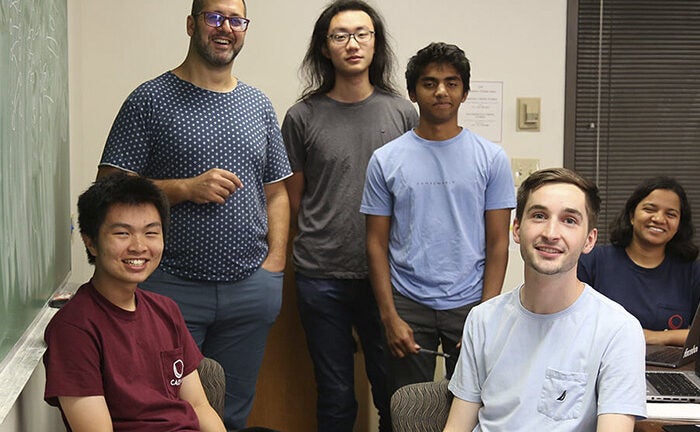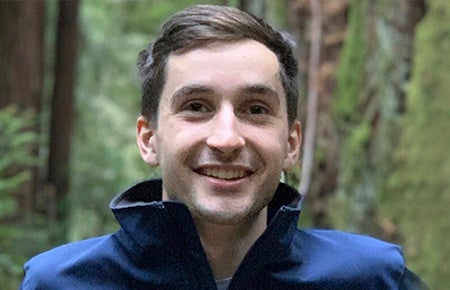
Goldwater Scholar wants to use AI to help ensure justice where children are involved
In cases of abuse or neglect by a caretaker, children are often the only witnesses. Currently, however, our legal system doesn’t view their testimony as reliable. Zane Durante, a mathematics major at the USC Dornsife College of Letters, Arts and Sciences, wants to change that.
Durante has been awarded a prestigious Goldwater Scholarship for his research into how to predict whether or not children are being truthful when they provide witness testimony. Durante, who is also majoring in computer science at USC Viterbi School of Engineering, conducts his research at the school’s Signal Analysis and Interpretation Laboratory (SAIL). There he analyzes written transcripts of children’s testimony using various machine learning methods and natural language processing. Machine Learning, in simple terms, is the science of getting computers to learn and make rational predictions all on their own.
“Eye witness accounts are already unreliable and children’s testimony is considered to be even more unreliable,” Durante says. “Courts don’t always use child testimony, even if it may be the only information they have on determining whether or not abuse has taken place.”
Durante’s research looks at the vocabulary children use in their testimony.
“Basically, we’re trying to put a score on how certain we are that the child is telling the truth or not, given the testimony, by looking at their language,” he explains.
Research may help a child witness tell the truth
The next step, Durante says, is to look at how incorporating audio and video recordings into the researchers’ machine learning models might improve their estimates on whether or not the child is being truthful or deceptive.
“Often, when humans are trying to determine whether or not someone’s lying, we look at many different things, including voice pitch and micro expressions that may only last for a fraction of a second but indicate a discontinuity between what the person’s saying and what they’re thinking and feeling,” Durante says. “Right now, we’re just looking at language, but ultimately we think that by incorporating these other features and data into our machine learning models, we’ll get more accurate predictions.”
While lie detectors are seen as the standard method of detecting deception, Durante notes that they actually don’t work very well, with meta-analysis giving them only about a 65% accuracy rate in determining whether or not a person is lying.
“That’s not usually admissible in court, and so we were really looking for something better,” he said.
Rather than being used after an interview to evaluate the probability a child witness was lying, the data could ultimately be used to give feedback during the interview to improve questioning so the child is more likely to answer truthfully.
The researchers also look at the emotional content of the words and the agreeability of the language used by the child. Durante and his team have found that the more agreeable child witnesses are, the less likely they are to be telling the truth. Another conclusion is that advanced vocabulary can be a sign of truthfulness because the child is being more descriptive.
Machine learning for social good
Durante’s interest in machine learning was sparked in the fall of his freshman year when he joined the Center for AI in Society’s student branch, CAIS++. The undergraduate group has student members from a wide range of majors, including engineering, computer science, computational linguistics, neuroscience and mathematics, all of whom are interested in machine learning and its applications for social good.
“I liked math and I liked computer science, and machine learning is this really interesting intersection of both,” Durante says.
After studying machine learning in the fall, CAIS++ members apply what they’ve learned to a project for social good in the spring. Durante led the curriculum last semester, teaching undergraduates machine learning skills, and he will be leading a group through a project this semester

USC Dornsife math major Zane Durante believes his future lies in innovating new methods and applications of machine learning. (Photo: Sajeev Saluja.)
His first project in CAIS++ looked at a type of neural network that could be used to predict whether an image of a skin lesion is malignant or benign. This would have applications for people who couldn’t see a dermatologist.
His second project, led by USC Dornsife’s Khalil Iskarous, associate professor of linguistics, focused on Ladin, an endangered language in Northern Italy.
Durante felt a personal connection to the project because his father spoke a Northern Italian dialect as his first language.
A major part of any language revitalization process involves linguists transcribing audio data of the spoken language by writing down the phonemes — the basic units of sound in a language, like the “d” sound in dog. This enables them to understand how it’s spoken and to reconstruct it. It’s a slow and laborious process.
“It can take four hours to annotate one hour of English audio data, and the process is much slower for endangered languages,” Durante says.
To speed it up, Durante and his fellow students are developing an auto-complete process using machine learning to predict phonemes.
At the core of all of the machine learning algorithms that Durante uses in his research is a lot of linear algebra and probability — both of which he learned in his USC Dornsife math classes.
“Both of those math classes build fundamentals that are necessary if you want to understand at a deep level what the algorithms are doing so you can make modifications to improve them or be more innovative,” he said.
Born in Houston to a professor of pharmacology and a medical researcher, Durante moved to Columbia, Missouri, with his family at age 6. He originally aimed to study pre-med courses at university but switched to math and computer science toward the end of high school.
Now he believes his future lies in innovating new methods and applications of machine learning.
“Whether that’s just new machine learning methods, new methods in natural language processing or computer vision, or some combination of the two, I want to be working on the frontier and pushing the field forward,” he says.
Over the summer, he completed an internship at Google where he developed artificial intelligence tools for Google Cloud.
Durante believes AI will speed up many things that society or humanity in general has traditionally been slow at doing, bringing many benefits.
While noting the ethical concerns around the use of AI and acknowledging that he has reservations of his own about some of its potential uses, he says he remains optimistic that the benefits to humanity will outweigh any negative use.
“Historically, we can see that as technologies improve, the quality of life has improved tremendously as a result. So, I think anything like machine learning that will make things easier for humans will just make life better for everyone.”